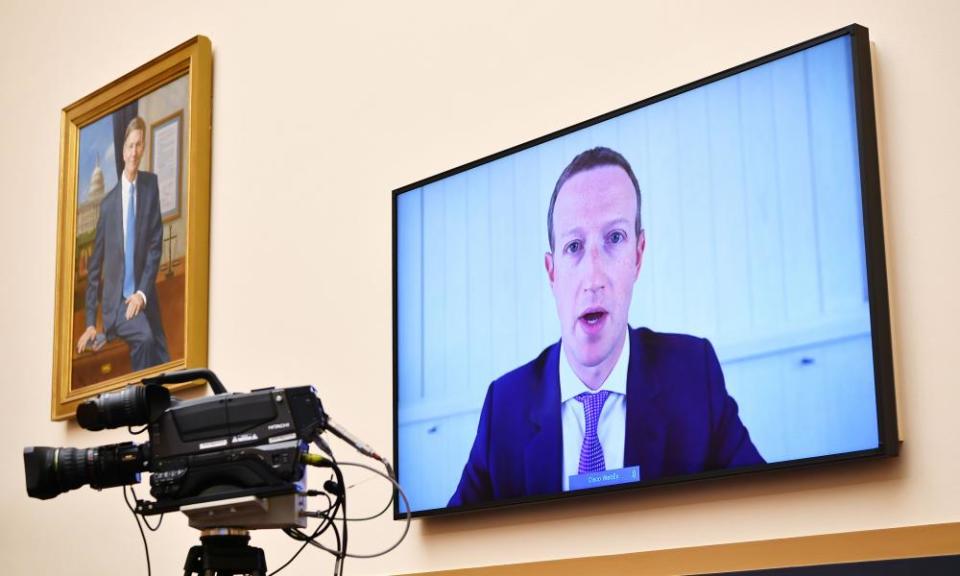Section 230: tech CEOs to defend key internet law before Congress

The CEOs of Facebook, Twitter and Google are expected to tell lawmakers in a rare appearance before Congress that a federal law protecting internet companies is crucial to free expression online.
Wednesday’s hearing with Mark Zuckerberg, Jack Dorsey and Sundar Pichai will take place less than a week before election day and was convened to address section 230 of the Communications Decency Act, a law underpinning US internet regulation that exempts platforms from legal liability for content generated by its users.
The hearing will investigate “how best to preserve the internet as a forum for open discourse”, according to the Senate judiciary committee, and it comes largely in response to allegations of anti-conservative bias in the tech world.
Senate Republicans indicated they wanted to question Pichai and Zuckerberg in October to discuss issues related to section 230. Dorsey was added to the mix after Twitter restricted the circulation of a controversial New York Post article that featured potentially hacked materials relating to Joe Biden’s son Hunter.
Related: Biden article row shows how US election is testing Facebook and Twitter
In prepared testimony for Wednesday’s hearing, Dorsey, CEO of Twitter, said eroding the foundation of section 230 “could collapse how we communicate on the internet, leaving only a small number of giant and well-funded technology companies”.
Facebook’s Zuckerberg warned that tech companies were likely to censor more content to avoid legal risks if section 230 were repealed. “Without section 230, platforms could potentially be held liable for everything people say,” he said.
The Facebook executive also argued that without the law, tech companies could face liability for doing even basic moderation, such as removing hate speech and harassment. He said he supported “updating” the rules for the internet if it were done with the potential consequences in mind.
Pichai said Google approached its work without political bias and was able to offer the information it did because of existing legal frameworks such as section 230. “I would urge the committee to be very thoughtful about any changes to section 230 and to be very aware of the consequences those changes might have on businesses and consumers,” Pichai’s written testimony said.
Republicans’ allegations that tech companies unfairly silence conservative voices is unsubstantiated. In fact, a recent report alleged that Facebook had suppressed progressive content to appease Republican lawmakers.
Still, Donald Trump has repeatedly accused Twitter and Facebook of censoring him and has zeroed in on section 230 as one of the culprits. Trump has stepped up his criticism since the companies began to label or even remove posts by the president or his campaign that spread misinformation or call for violence.
“Repeal section 230!!!” Trump tweeted on 6 October, after Twitter added a misinformation warning label to one of his tweets claiming the flu is more deadly than Covid-19.
Ironically, the repeal of section 230 protections would probably lead social media platforms to take more, not less, action over Trump’s posts, as it would hold them legally liable for any falsehoods he posts. Experts say the effects would be comparable to what was seen with the passage of Fosta/Sesta, legislation that held platforms responsible for sexual service advertisements posted on their sites. The passage of those bills led to the removal of Craigslist personal ads and upended content policies on sites like Tumblr.
Privacy advocates have long called for the protection of section 230, saying it is integral to internet freedom. The Electronic Frontier Foundation, a non-profit civil liberties group, called section 230 “the most important law protecting internet speech”.
The Internet Society, another non-profit organization advocating for internet access, warned that poorly informed policy decisions on section 230 could bring “dire consequences” for what we are able to do online.
That is because the law applies not only to platforms like Facebook and Twitter but to other internet infrastructure like domain name registries and internet service providers. Without section 230, these entities may have to approve content prior to posting or take other action that would significantly slow the flow of the internet as we know it.
Despite the warnings, the modification of existing regulations has become a major point of contention in the run-up to the election, with both presidential candidates proposing section 230’s repeal. There have been an additional 20 attempts to amend or revoke the law in the past two years.
In addition to discussions on reforming the law, the hearing will bring up issues about consumer privacy and media consolidation. On Tuesday, Senator Maria Cantwell, the top Democrat on the Senate commerce panel, released a report on how big tech platforms have decimated the local news industry, including newspapers and broadcasters.
The tech executives will begin their testimony at 10am ET and all three will appear remotely.
Reuters contributed reporting

